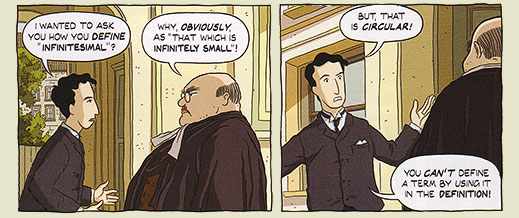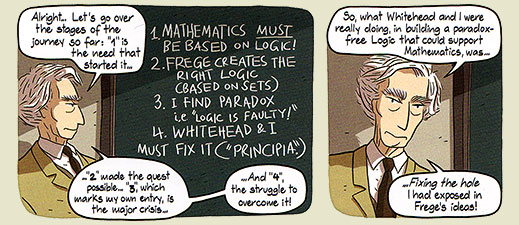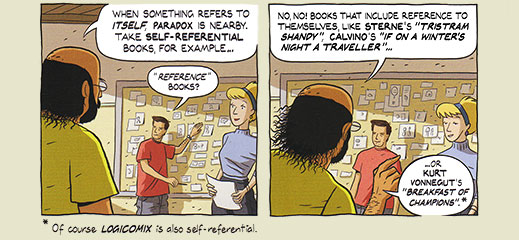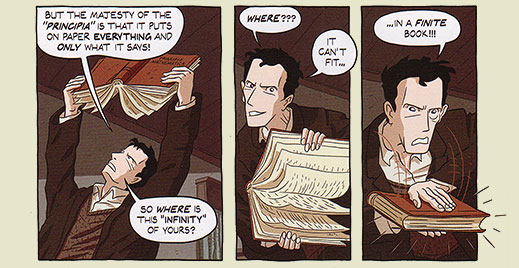Logicomix
Created by: Apostolos Doxiadis, Christos H. Papadimitriou, and Alecos Papadatos
Published by: PUBLISHER
ISBN: 1596914521 Amazon
Pages: 352



When age-spanning epics are called for, there are few so often drawn from the Great Well of Story Archetypes as the battle between order and chaos. In the realms of the human and the personal, some variation of Boy Meets Girl is undoubtedly the go-to narrative frame. But when a teller really wants to up the stakes and sell his audience either a cosmology or an apocalypse, only gods and monsters will do. And such a pairing (almost until the postmoderns) demands Order in one corner, girded and ready, honed to perfection and waiting with grim determination to show ropes to Chaos, who spills out over the opposite corner, spoiling for blood and violence and the reckless anarchy of the brawl. It's the story of Yahweh and Lucifer, of Marduk and Tiamat, of Feanor and Melkor, of Gandalf and Sauron. And it's the story of Bertrand Russell as romantically couched by Apostolos Doxiadis and Christos H. Papadimitriou.
I haven't read a lot of Bertram Russell. Apart from a couple scattered essays, breezed through nearly twenty years ago, my acquaintance with the man's work is nearly without existence. And those writings I have spent time with have been rather facile, wholly practical works—neither of which included any expression of maths at all. Honestly, while I knew of Russell's status as a logician, I was unaware of what exactly that meant and exactly how foundational was Russell's place in the logical pantheon. (And this after taking several semesters of logic in college. We studied the application of logic rather than the history of the stuff and I didn't study enough of it to get beyond base symbolics, which I rather enjoyed.)
It seems that I missed out on a lot.

Logicomix is the story of what is apparently Russell's masterwork, Principia Mathematica, in which Russell seeks to ground mathematics in logic rather than in mere axiom. More though, as Logicomix unfolds, we see that the formation of the Principia is really Russell's struggle to impose Order on a world that seems to be built on Chaos. Doxiadis and Papadimitriou work hard to sell the concept, even to the point of overlaying the Oresteia as an interpretive framework. Will order govern chaos? Will logic come to supplant madness?
The authors keep us excited and invested in the tale's outcome. We see the stakes clearly spelled out by Russell even at an early age as he wrestles with the arbitrariness of the world as described to him by his religious aunt. We see his conundrum as his excitement over the promise of mathematics collapses entirely when he realizes his supposed salvation is built upon what amounts to wishful thinking. We see his hopes laid bare as he looks to logic for a foundation for mathematics—and so a foundation for belief in an ordered universe. We see the detritus of a history of logicians whose minds broke against the fortressed walls of infinity and paradox. Will Russell succumb? Will he find the elixir to banish paradox? Will he in his alchemical balance of math and philosophy—in his inundation into the fountain of logic—find salvation? Will we? Or will he only find one more succubus, a myth that will drain him of life and reason, leaving him as much a wreck as his predecessors?
Doxiadis and Papadimitriou excel at putting forth Russell's dilemma in terms easily understandable. We feel Russell's pain as he and his partner, Whitehead, struggle for years to find their solution. We wait with the rest of the early 20th century's logical community for a solution to Russell's paradox, what amounted to a devastating blow to the superstructure of logic itself. We understand why Russell teeters on the brink of madness, even as his forerunners Cantor and Frege succumb. Unfortunately, and perhaps this is testimony to its complexity, the authors only offer the most brushing glance at Russell and Whitehead's solution (and of Kurt Gödel's extrapolation). We see that it's there, that Russell has done... something. Only we aren't told what exactly.

Personally, I would have liked a page or two more on this tack. Even if a simplified explanation still sat over my head, at least I'd be able to pick at it, circle in on it, and take it apart at my leisure. As is, if I'm inclined to discover what Russell ended up doing, I'm forced to find that out on my own.
Still, as the creators attest in one of their self-referential fourth-wall-sundering interludes, their primary concern in this saga is the persons rather than the ideas. While the ideas belong to the characters and help shape their figures in our imaginations, people who are well-sketched are people built of emotions and histories and romance and goals and anguish. They are made of their circumstances and their ideas are made of them. Logicomix fights foremost to tell the story of people as people. And here it succeeds unflinchingly.

Every one of its figures are persons with their own lives and histories, all of which I am interested to discover. Should the creative team here devote pages to any one of the mathematicians, philosophers, or logicians that wander across Russell's life as presented here, I will purchase and read such a book. Wittgenstein in particular marks a character who I'd love to see pursued in his own book—even though Wittgenstein inhabits a fair percentage of Russell's book, I was thirsty for more.
 Oh Wittgenstein, could I ever not love you?
Oh Wittgenstein, could I ever not love you?
Logicomix as biography is somewhat lacking, in that it tails off a good thirty years before Russell's death and leaves the story of the Principia's final impact upon logic merely hinted at. But as a story of Russell's search for order against the winds of chaos, I found the book a compelling excursion. The book is subtitled An Epic Search for Truth and, while the howling of Madness still sits spectre behind Russell's quest for a foundation in Logic, at the least Logicomix delivers a worthwhile yarn pretty near on a level with Marduk's duke-out with Tiamat.
Good Ok Bad features reviews of comics, graphic novels, manga, et cetera using a rare and auspicious three-star rating system. Point systems are notoriously fiddly, so here it's been pared down to three simple possibilities:
3 Stars = Good
2 Stars = Ok
1 Star = Bad
I am Seth T. Hahne and these are my reviews.
Browse Reviews By
Other Features
- Best Books of the Year:
- Top 50 of 2024
- Top 50 of 2023
- Top 100 of 2020-22
- Top 75 of 2019
- Top 50 of 2018
- Top 75 of 2017
- Top 75 of 2016
- Top 75 of 2015
- Top 75 of 2014
- Top 35 of 2013
- Top 25 of 2012
- Top 10 of 2011
- Popular Sections:
- All-Time Top 500
- All the Boardgames I've Played
- All the Anime Series I've Seen
- All the Animated Films I've Seen
- Top 75 by Female Creators
- Kids Recommendations
- What I Read: A Reading Log
- Other Features:
- Bookclub Study Guides









